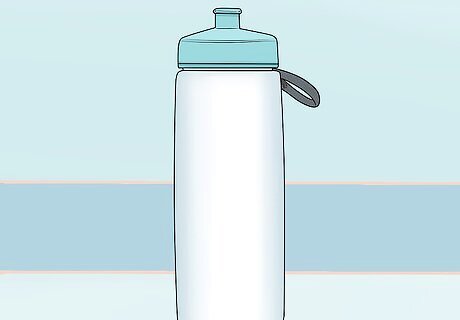
views
X
Trustworthy Source
Mayo Clinic
Educational website from one of the world's leading hospitals
Go to source
Although the benefits of weight loss may be great, getting your husband on board with a weight loss plan can be tricky. Help him understand the importance and benefits of weight loss in addition to providing him with healthy foods and opportunities for exercise. Together, you can help him lose weight and improve his overall health.
Helping Him Change the way He Eats

Review diets together. Some people find it easier to follow a specific diet plan rather than going at it by themselves. Research a few different diets to see if any of them would be easy to follow and help your husband lose weight. There are a variety of popular diets out there. It's important review a few before making any decisions. Make sure that the diet is reasonable and something you can easily do for long periods of time. If he can't picture himself maintaining the diet for at least 5 years, it probably isn't a good starting point. Low-carb diets are very popular. These diets typically focus on protein, healthy fats and limited amounts of carbohydrates. Studies have shown that these diets show faster initial weight loss. Low-calorie and portion control diets are also popular. They focus on small portions and monitoring or counting calories daily. These diets may not result in as much weight loss compared to low-carb diets, but are much more balanced and easier to follow long-term. Don't worry about him losing weight fast! Instead, focus on helping him develop healthy, long-term eating habits.

Stock your house with healthy foods. If you are the main grocery shopper in your household, help your husband by stocking your home with healthier foods. When there isn't junk food or treats around, your husband is more likely to skip eating at all or choose a healthy choice that's available. Keep healthy snacks for you and your husband. Ideas include: individual low-fat yogurts or cottage cheese, low-fat cheese sticks, fruits, sliced raw vegetables, hard boiled eggs, hummus, all natural nut butters or nuts. Ditch the sweetened beverages and fill your fridge with calorie-free, hydrating fluids. Keep a pitcher of cold water, flavored waters, decaf coffee or decaf iced tea in the fridge for easy access. Fruit, veggies, whole grains, beans, lentils, and fatty fish are all great options for a heart-healthy diet.

Pack his lunch. With busy work schedules or long commutes, many people are choosing to eat out or order in take out for lunch. However, studies show that when you brown bag lunch you save money and calories. Try packing lunch for your husband each day. This may help prevent him from going out and getting something that might be higher in calories. If you're rushed in the morning, pack lunch the night before. You can pack leftovers from dinner, salads with lean protein (dressing on the side), whole wheat wraps with lean deli meat and cheese or a thermos with soup. You may need to purchase a lunch box, tupperware containers or ice packs to help keep his lunch at the appropriate temperature throughout the day.

Prepare well-balanced meals. Even if you're watching calories or following a particular diet, it's important to cook healthy, well balanced meals. This will help support your husband's weight loss and ensure he's getting a variety of nutrients each day. Include lean protein at all of his meals. Talk to your husband about the importance of lean protein at each meal. It will help him stay satisfied longer and manage his hunger throughout the day. Lean protein includes: seafood, poultry, eggs, lean beef, legumes, tofu and low-fat dairy foods. Cook with a lot of fruits and vegetables as well. Having a variety of these as options can help your husband lose weight. Both fruits and vegetables are very low in calories and contain a lot of essential nutrients. Pack these foods in his lunch, keep them available as snacks and have 2-3 servings at dinners. Use whole grains when you prepare meals. These types of grains contain more fiber, protein and other nutrients that will support weight loss. Choose 100% whole wheat bread or pasta, brown rice, quinoa or whole grain oats.

Cook together. If you have time, pick a few nights for both you and your husband to cook together. Not only does this help you bond, but can get your husband interested in preparing healthy foods. Cooking with your husband will give him some hands on time with his food. This may spark his interest in healthy cooking and motivate him to eat healthy. If your husband is changing his diet, you should too. Eating what he eats may help him feel supported. If you haven't made any changes or are eating tempting foods while he's eating healthy, this could side track him from his diet.

Serve food on smaller plates. When you prepare dinner for your husband, pack his lunch or set out his breakfast, use smaller plates. Studies have shown that when you eat off of smaller plates, you end up consuming less food. Swap out your typical dinner plate with salad plates or appetizer plates. Use smaller bowls, small utensils and glasses as well. If your husband prepares his own meals, move the larger plates and bowls to a cabinet out of the way. Place small plates, bowls and cups within reach so he's steered towards these portion controlled dishes.

Buy him a reusable water bottle. Drinking adequate fluids daily is an essential part of a healthy diet and can help your husband stay hydrated and satisfied throughout the day. Your husband's water goal each day may be slightly different from yours. But encourage him to drink about 10-13 glasses of hydrating fluids each day. Tell him to use his reusable water each day - filling up as many times as he needs. You can also fill it up for him and send him off to work with a nice cold bottle of water.
Encouraging Him to Make Lifestyle Changes

Schedule a doctors appointment and go with him. Going to the doctor prior to weight loss is important for anyone. If you can, set up a appointment for your husband to speak with his doctor regarding weight loss. Go with your husband so you can be a support system to him and be able to ask questions of the doctor. It's also good to have another set of ears when you're at the doctors. You can incorporate some of the tips the doctor gives regarding weight loss.

Exercise together. Studies have shown that if you work out together, you're more likely to stay on track with your workouts. If you're husband is feeling reluctant to exercise, ask if you can do something together. You can connect, chat and exercise all at once. If your husband isn't interested in more traditional exercises like going to the gym or running, find activities that are more enjoyable for him. For example, you might go hiking together on the weekend, or take a walk in the evenings. Try to motivate your husband to be active regularly. Together, you should both aim for about 150 minutes of aerobic exercise each week.

Go to bed earlier. Getting adequate rest is incredibly important for weight loss. If your husband is someone who stays up late or gets up early in the morning, try to encourage him to get more rest. It's recommended for both men and women to get about 7-9 hours of sleep each night. It helps manage your hunger and ability to use insulin. Help your husband get a restful night's sleep by turning off the TV, leaving cell phones or computers out of the bedroom and turning off lights when you're ready for bed. Ask your husband to come to bed earlier with you. He might be more tempted to hop in bed if you're there with him. You can read together, talk or listen to music as you wind down from your day.
Supporting His Weight Loss Efforts

Don't be the "food police." The last thing anyone wants to hear when they're are losing weight is "don't eat that" or "are you supposed to be eating that?" Being the food police can be discouraging and annoying to your husband as he tries to lose weight. If your husband reaches for an unhealthy choice, he's most likely aware of what he's doing. Instead of pointing out his mistakes, suggest a healthier option or ask if he'd like to get out for a walk. Some examples include: If your husband sits down to watch TV, ask to go for a quick walk together. If you're out to eat and he orders something less healthy, ask if he'd like to split the entree with you to limit his portion size. If he's not up for a gym session, ask if he'd like to do a fun activity like hiking or a scenic bike ride. Remember, it's ok for anyone to indulge in a favorite treat occasionally.

Write up a goal timeline for your husband. Setting goals for his weight loss can help your husband stay focused and stay on track. Together, come up with goals for your husband's weight loss. If your husband needs to lose a large amount of weight, set up multiple smaller goals. This can help him feel successful along the way to a larger goal. Include goals regarding weight, pants size, fitness level or health markers (like blood sugar). The more goals he meets, the more excited and motivated he'll be to stay on track.

Plan fun rewards. Having a fun reward waiting at the end of a weight loss plan can be exciting and motivating for anyone. Help your husband stay on track with his diet by planning something fun as he makes progress. Set up a goal timeline with your husband. For every goal he meets, plan a reward for him. Try: a round of golf, a night out at the movies, a new shirt or new gym outfit or a gift card for online music. Try to avoid food related rewards. This might be counterproductive for those who are trying to lose weight.



















Comments
0 comment